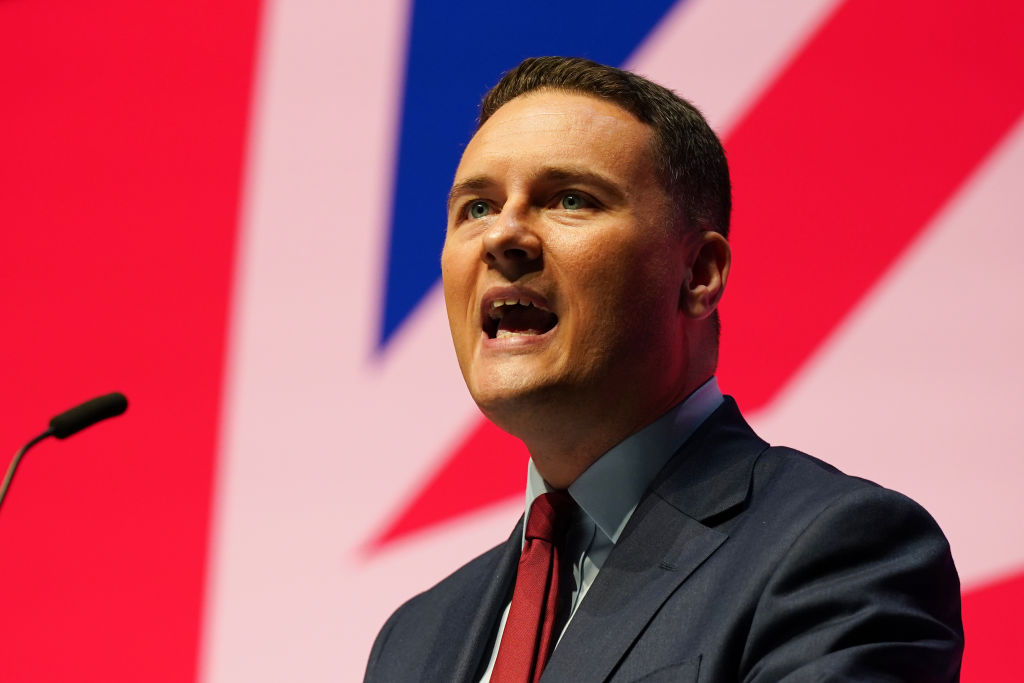The NHS faces an institutional and structural problem in the way it works, Wes Streeting believes. ‘Unless it changes, it’s not going to survive.’ The shadow health secretary’s ‘tough love’ philosophy suggests NHS bosses are very much mistaken if they expect much more generous health spending under a Labour government. Instead, Streeting has slammed the health service for using winter crises as an ‘excuse’ for funds.
Streeting’s interview in today’s Sunday Times comes as the health service is facing record high waiting lists of over 7.5 million and record waiting times (with 3.2 million waiting over 18 weeks for care). More junior doctor strikes have been announced as medics remain unhappy with their pay and working conditions – which inevitably means many more appointments and procedures will have to be rescheduled. The hospital system is congested: patients arriving in A&E are having to wait too long before they’re seen, while those fit for discharge from wards are left languishing as the country’s social care services have less and less capacity to cope with demand. But Labour doesn’t see the answer as simply funnelling more money into the system.
Part of the reason for this is it can’t. Keir Starmer has said Labour won’t turn on the spending taps while the tax burden is on course to hit its highest level since the Second World War. In accepting the financial predicament it looks likely to inherit, Labour has had to reconsider its approach to the crisis in the NHS. Streeting’s ideas are radical, but not in the way you might expect. Instead of planning to completely reorganise the NHS, he’s more interested in specific areas of inefficiency.
One example is GP time. Taking inspiration from Singapore, Streeting wants to move back to a ‘family doctor’ system where every patient is anchored to a GP, removing the ‘red tape’ that slows community doctors down and improving on the current system of funding allocation for practices. He also plans to cut unnecessary referrals so that patients aren’t bounced between GPs and hospitals, and back again. And the shadow health secretary is keen to make community healthcare a seven-day operation, with neighbourhood health centres open in the evenings and on weekends.
In terms of the bigger picture, Streeting wants to ‘get rid of the stupid stuff that is holding the system back’. He pointed to the lack of communication between different hospital services, meaning patient records aren’t immediately available when a patient moves. There are less obvious inefficiencies too: different hospital trusts are all run in slightly different ways, which can cause issues for staff moving between them as well as affecting the transfer of patient information. Technology will play a crucial role here. Streeting wants to replicate Singaporean health apps to improve links between GP and hospital services and encourage patients to make better lifestyle choices. One points-based app awards users who improve their fitness with supermarket discounts – which could be one way of dealing with the UK's £100 billion-a-year obesity crisis.
Many of Streeting’s proposals will be welcomed by clinicians, who – as Streeting tells the Sunday Times – ‘can see the examples of waste and inefficiency’ in the service. His plans to both regulate and improve the quality of NHS managers (essential particularly after the revelations of the Lucy Letby case) would mark an important development in the role of non-clinical NHS staff. The shadow health secretary points to the ‘dead weight of management bureaucracy’ that medics feel prevents them from being able to adapt to a changing patient population – with ageing patients the 1948 national health service was never built to manage.
But while Streeting talks about the need to ‘adopt a culture of innovation’, his support of the NHS workforce plan concerns some medics. They worry an already crippled system will become flooded with physician associates (healthcare workers with advanced responsibilities without a medical degree) in place of qualified doctors. Promising innovation is one thing, but NHS staff are growing increasingly disillusioned with their workplace. Streeting has hinted a Labour government would offer striking doctors a more generous deal than what is currently on the table (a 6 per cent rise plus a payment of £1,250) – but this is still likely to be much lower than the full pay restoration to the 2008 levels the BMA are looking for, and may not stop the strikes.
The shadow health secretary has become bolder in expressing his feelings about NHS reform. In October he talked of ‘rewiring’ the health service – now he’s clear that it’s ‘a service not a shrine’. His pragmatism will help him, he appears to think, mould a system that is more patient-centric and doctor-led. Will Streeting be the health secretary that saves the NHS on a budget? He’ll certainly have his work in government cut out, if he does indeed get that far.







Comments